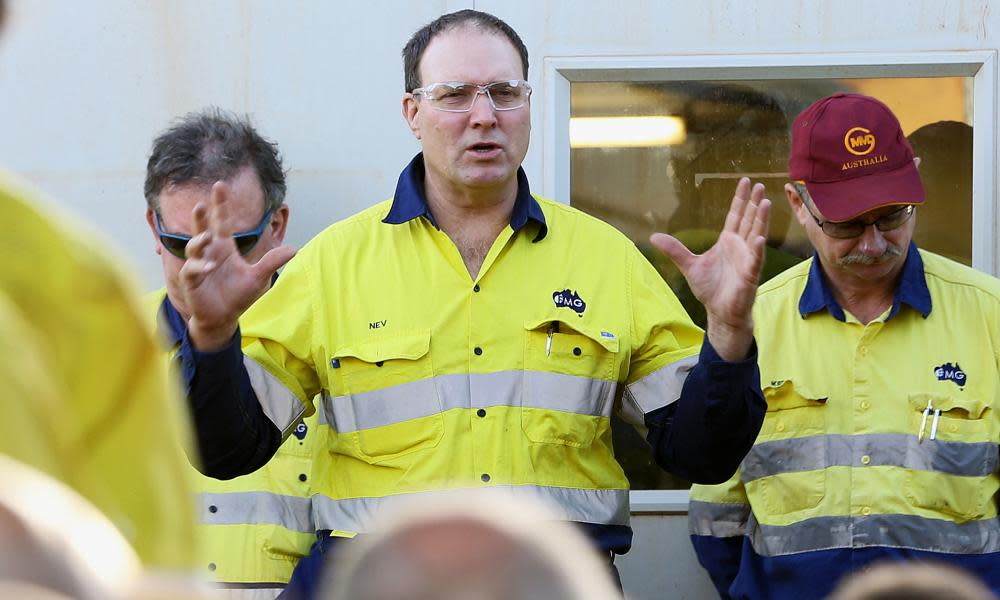Fortescue signals it will appeal in Pilbara native title case

Fortescue Metals Group is likely to appeal against a determination of exclusive native title for Yindjibarndi people over land in the Pilbara which encompasses its Solomon Hub mine.
On Thursday the federal court ruled in favour of the Yindjibarndi traditional owners, awarding exclusive rights and interests over about 2,700 sq km of unclaimed crown land, which encompasses FMG’s $110bn mine.
The company responded on Thursday that it had “no commercial concerns and do not anticipate any material financial impact following the court’s determination,” but on Friday its chief executive suggested it would appeal.
Nev Power told ABC local radio he thought the court’s decision was wrong.
“I think we are likely to appeal,” he said. “It’s a very unusual decision in that the judge has found exclusive native title possession on this land, which we think is unlikely to be the case. So we will be looking at it definitely and considering an appeal.”
Following the decision on Thursday FMG shares dropped 19c to $5.19, and opened at $5.05 on Friday.
In his ruling Justice Steven Rares said it was undisputed the Yindjibarndi maintained a strong and unbroken connection to their lands.
“ I am satisfied that the Yindjibarndi established ... that a manjangu (or stranger) still has to obtain permission from a Yindjibarndi elder before entering or carrying out activity on Yindjibarndi country,” Rares said.
Greg McIntyre SC, who specialises in native title, said a similar case related to exclusive native title in the Pilbara was unsuccessfully appealed by the government to the high court.
McIntyre said in his view it made no difference to the company whether the native title was exclusive or not, except in relation to another significant court ruling on Thursday which dismissed an appeal against the Timber Creek compensation case in the Northern Territory.
The amount awarded for interest in that case has prompted speculation that it could pave the way for huge payouts to Indigenous groups who suffered loss of native title due to actions by government and lessees such as mining companies.
In the Timber Creek case more than $3.3m was initially awarded in damages to the Ngaliwurru and Nungali groups for NT and commonwealth government acts on their land in the 1980s and 90s, which led to the extinguishment of native title, as well as hurt, loss of spiritual connection and loss of attachment to land.
That amount included about $1.48m in interest, although the appeal judges reduced the interest payment calculation from 80% of freehold value to 65% of freehold value.
McIntyre said Timber Creek was a small area, with non-exclusive native title.
He estimated that because the Yindjibarndi had exclusive native title they might be up for 100% of the value for compensation for any native title they had lost.
The Yindjibarndi decision also set out damages for non-economic loss, including the loss of culture or the ability to conduct ceremony or protect the land, and associated humiliation.
“It’s quite an interesting judgment because it does seek to deal with the question of how you deal with whitefella, or non-Indigenous, property value, and then how you deal with non-economic loss,” McIntyre said.
“It creates a paradigm or a set of criteria, a starting point which we haven’t had up until now.”
On Friday Power pointed to the Timber Creek case to downplay speculation FMG could face costs of more than $100m in compensation, a figure he said was “wildly inaccurate”.
“This is a very complex area, however it comes down to the level of compensation under the Native Title Act,” he said.
“And the only case that has been heard was a case in the Northern Territory where there was around $3m awarded for a number of native title extinguishments, and that was over a whole town.
“So we think the level of compensation will be way less than that.”

 Yahoo News
Yahoo News 
